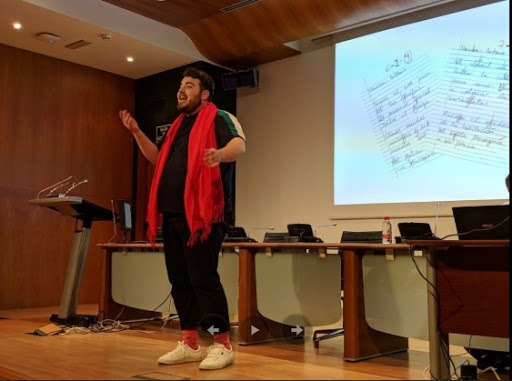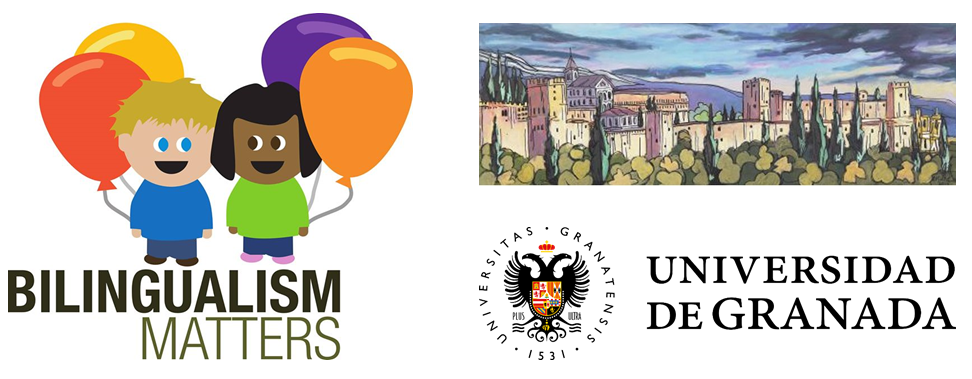Monólogo “Pesadilla Ortográfica” en el concurso 3MT // “Orthographic Nightmare” Monologue in the 3MT competition
Antonio Iniesta, investigador del equipo de Bilingualism Matters UGR, participó en el concurso 3MT de la Universidad de Granada. En un tiempo de 2 minutos y 50 segundos, explicó mediante la historia de su hermano y sus constantes errores ortográficos en los exámenes del colegio, la consecuencia de la co-activación en la escritura de bilingües. Bajo el título “Orthographic nightmare” (Pesadilla ortográfica) el investigador presentó resultados preliminares de su tesis.
Antonio Iniesta, one of our Bilingualism Matters UGR team members, participated in the 3 Minute Thesis contest at the University of Granada. Using the story of his brother and his constant orthographic errors in school exams, Antonio explained in 2 minutes and 50 seconds the consequences of language co-activation in bilinguals while writing. In a monologue titled “Orthographic nightmare”, the researcher introduced the preliminary results of his thesis.
Aquí os dejamos las preguntas que le trasladamos a la protagonista y que amablemente ha querido compartir. Here are some answers to the questions we asked Antonio in a mini-interview.
¿Qué te pareció la experiencia de 3MT? What did you think of the 3MT experience? El doctorado es una preciosa etapa de mucho aprendizaje y crecimiento personal, pero en el que hay que enfrentar algunas crisis existenciales y momentos de desmotivación en los que quieres dejar todo. Esta experiencia supuso un momento de conectar con la ciencia y volver a valorar mi trabajo y recuperar el entusiasmo. Muchas veces familiares y amigos preguntan sobre qué haces en tu trabajo, y resulta difícil deconstruir toda la jerga y buscar una historia que transmita todo tu trabajo. Es un gran trabajo creativo que habitualmente no hacemos, con un equipo de personas maravilloso que te guían y te ayudan a como enfocar el discurso. Ayuda a establecer puentes entre tu contexto social y laboral y los acerca. The Ph.D. is a beautiful period of life, full of new learning and personal development, but it’s also a stage in which you inevitably face some existential crises and moments of demotivation in which you want to give up. This experience allowed me a moment to connect with science, value my work, and recover enthusiasm for what I do. Many times, family and friends ask about what I do at work, and it is difficult to deconstruct all the jargon and find a story that easily explains it. It requires great creativity to explain things to a non-specialized crowd, and it’s something that we as doctoral students don’t usually do. However, with a wonderful team of people to guide and help focus the speech, it was possible. It helped me establish bridges between my social and work contexts and brought them closer together.
¿Cómo te sentiste al divulgar tu investigación en tu segundo idioma How did it feel having to explain your research in your second language? Este era mi mayor hándicap. Estaba acostumbrado a hablar en público, me gusta hacerlo, y tengo bastante facilidad para expresarme. Sin embargo, mi nivel de inglés no era muy bueno y me daba mucha vergüenza tener que hablar en publico en inglés. Enfrentar esta situación me ayudó a romper miedos e inseguridades, y supuso un punto de ruptura, a partir del cual mi nivel de inglés conversacional ha mejorado mucho. Es verdad que el discurso lo tuve que simplificar mucho a nivel de ideas y frases para sentirme cómodo con el texto final. Me daba miedo a perder mi esencia al cambiar el idioma, pero conseguí un equilibrio que me hizo estar muy cómodo con él. El texto me representaba 100%. This was my biggest handicap. I was used to speaking in public, in fact, I like to do it, and it’s easy for me to express myself. However, my English level was not very good and I was very embarrassed of having to speak it in public. Facing this situation helped me break down fears and insecurities, and it was a turning point as well, from which my level of conversational English has improved a lot. It’s true that I had to simplify the speech a lot at the level of ideas and phrases to feel comfortable with the final text. I was afraid of losing my essence when changing the language, but I achieved a balance that made me very comfortable with it. The text represented me 100%.

